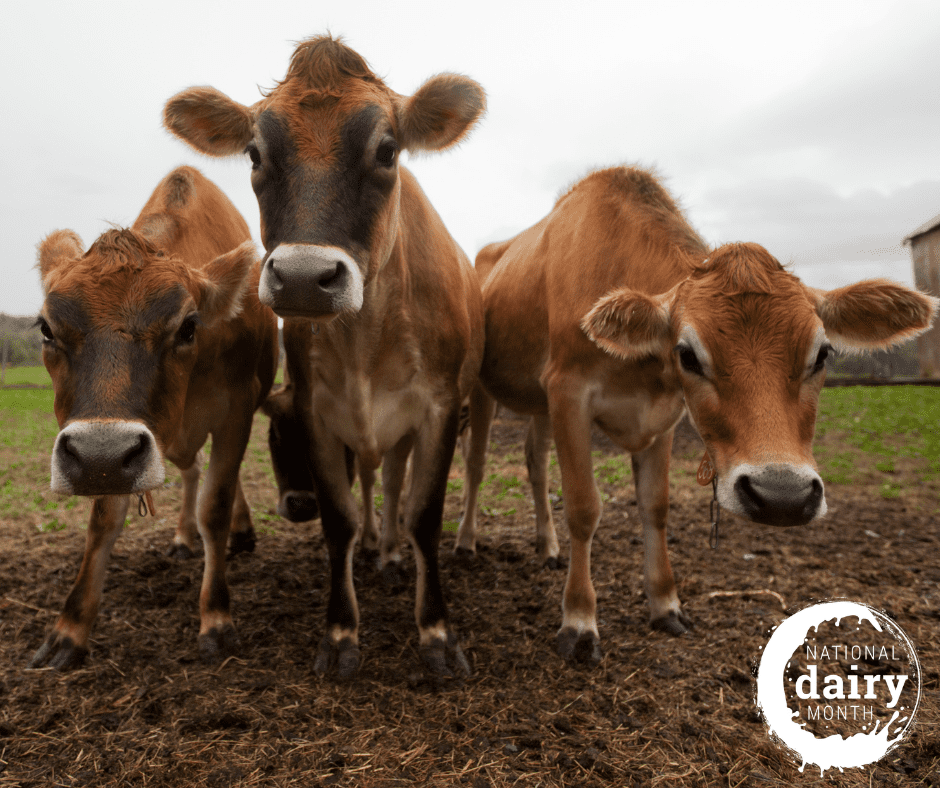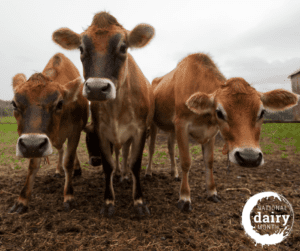
About National Dairy Month and World Milk Day
June is National Dairy Month! This annual event celebrates the dairy industry, our hardworking farmers, and the nutritious dairy foods we all know and enjoy. The first of June is designated World Milk Day, recognizing the importance of milk as a global food.
2023 National Dairy Month Theme
This year we are celebrating the farmer and the cow, highlighting cow care and the amazing things dairy farmers are doing across New England and beyond. This year’s theme showcases the dairy industry’s sustainability work, contributions cows make beyond milk production, and how dairy farmers care for our land, water, and air.
Farmer Resources for National Dairy Month
World Milk Day Materials
Celebrate World Milk Day by sharing information about the health benefits of milk. Find logos, social media posts, blogs, videos, and more here.
National Dairy Month Badge
Download the National Dairy Month badge and add it to your social media photos to show your dairy pride.

Order Promotional Items
From cow hats to pencils, we have a variety of free promotional items for New England farmers to order for upcoming events.
Resources for Farm Tours & Events
New England Dairy has a two-page farm tour checklist and a more in-depth on-farm event guide to support you in welcoming visitors to your farm during National Dairy Month.
Shareable Videos and Resources
Share New England Dairy’s sustainability and cow care videos on your social media channels or download printable posters and other graphics from our resource library.
Dairy Promotion Grants
Keep the celebration going beyond June and apply for a grant to support your dairy promotion efforts. Grant applications open June 12. The deadline to apply is July 12.
Dairy Recipes
Explore our delicious dairy-filled recipes and share your favorites!
Sample Social Media Messages
View social media messages that are ready for you to share with consumers.
- Cows are the ultimate upcyclers 🐄 They’re able to consume parts of foods humans can’t, like citrus pulp, spent brewers’ grain, and more. This keeps cows happy and reduces food waste.
- Dairy farmers are making nutritional changes to their cow’s diet, like adding starches, fats and seaweed, which may help reduce methane emissions by up to 20-50%
- Just like you recycle in your home, dairy farmers recycle too ♻️💦 Water on the farm can be used up to four times to cover everything from chilling the actual milk produced to drinking water for cows, to cleaning of stalls and irrigation of crops.
- Dairy farmers are environmental stewards, and we take a proactive approach to sustainability. We continue to embrace new technologies to help us tend to our land and water with care. Producing a gallon of milk has 19% less greenhouse gas emissions than it did in 2007.
- For dairy farmers, caring for the land is an important part of our work. We rely on the sun, air, water, and soil to help us produce a safe, nutritional product for you to enjoy 🥛🐄
- Despite what you may have seen in sensational headlines and documentaries, producing dairy has a surprisingly small environmental footprint, being responsible for just 2% of all U.S. GHG emissions. By comparison, transportation as an industry in the U.S. accounts for 28% of GHG emissions.
- On our farm, a digester is one tool we use to reduce waste. Digesters help break down cow manure or food waste and create biogas, which can be used for electricity, heat, compressed natural gas, and even vehicle fuel. Watch how digesters turn waste into a product we can use: https://youtu.be/jets9VDMT-E
- While the dairy industry has made progress, there’s certainly more work to be done. The dairy industry’s Net Zero Initiative will optimize water use while maximizing recycling, improve water quality by optimizing utilization of manure and nutrients, and achieve greenhouse gas neutrality by 2050. These environmental stewardship goals are just one way the dairy industry is leading the way in sustainability. Learn more about the 2050 U.S. Dairy Sustainability Goals: https://www.usdairy.com/sustainability/environmental-sustainability/net-zero-initiative
- Dairy farmers care about the planet – just like you. Learn more about how farmers are protecting our land, water, and soil: https://www.newenglanddairy.com/sustainability/
- One cow can produce up to 100 pounds of manure each day, so responsible manure management practices are important for every farmer. Watch this video to see how dairy farmers ensure manure stays on their fields and out of our waterways: https://youtu.be/QRpvvVcg4eA
- Healthy soil and clean water are the foundation of our work. 🌱 There are several environmentally friendly practices to improve soil health and keep our rivers and lakes clean, including planting cover crops and vegetative buffers. Learn more ➡️ https://www.newenglanddairy.com/carbon-smart-dairy-farming/
The above messages are recommendations. You can adapt them to your voice and add your own farm stats or information. If you’re doing something cool on your farm, like taking cardboard from your local transfer station to shred and mix in with your bedding or recycling food waste from your local school district, share that story.
Hashtag options
#WorldMilkDay (use June 1)
#NationalDairyMonth (use June 1-30)
#EnjoyDairy (use June 1-30)
#UndeniablyDairy (use anytime)
Tag New England Dairy
You can tag New England Dairy in your content using @NewEnglandDairy.
Let’s Keep the Conversation Going
New England Dairy is here to help you tell your dairy story. Our team can help you write a letter to the editor or op-ed for your local newspaper, or we can support you with other ideas you may have to tell your story. Contact Farmer Relations Manager Elicia Pinsonault at epinsonault@newenglanddairy.com or Farmer Relations Specialist Jennifer Schenkel at jschenkel@newenglanddairy.com for more information.